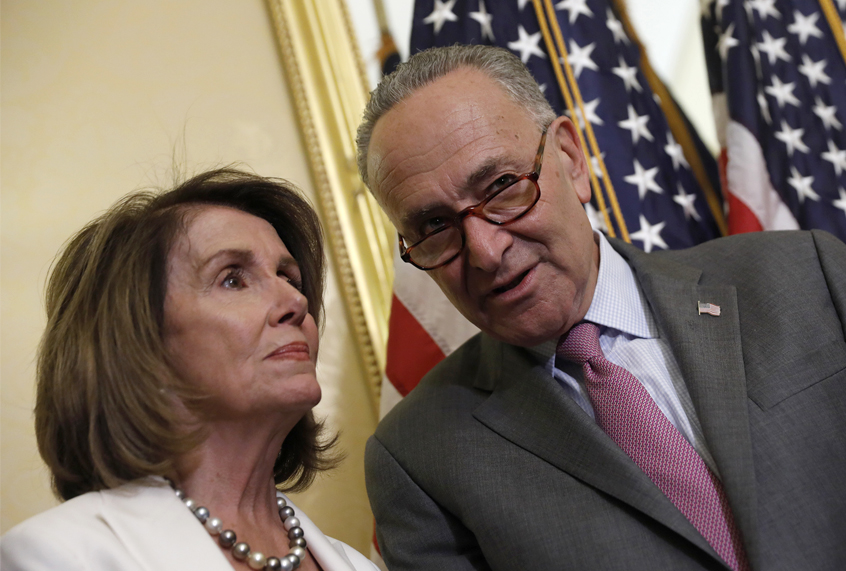Let me offer a theory about why Democrats in Congress are not going after the Republicans’ worst tax bill ever with the same visceral vehemence they used to oppose the GOP’s efforts earlier this year to gut Obamacare and Medicaid.
The House and Senate versions of the bill, while differing in some particulars, have been parsed by the country’s best fiscal analysts, and as longtime tax policy investigative reporter David Cay Johnston noted, “share the same basic feature: huge tax savings for big business and the rich, while more than half of Americans may see their income taxes rise between now and the end of 2027. You can read solid analyses by three organizations with track records for accuracy in their tax and spending estimates here, here and here.”
So why are the Democrats not making more noise about a giant reverse-Robinhood scheme, that at least on the Senate side, also includes moves to gut Obamacare by ending the tax penalty for not carrying health insurance. If passed, that provision would allow millions to drop their coverage, which in turn, would raise premiums for everyone else. Remember how last summer Dems rose in the House and Senate to remind Republicans that tens of thousands of voters in their districts would lose their healthcare?
The answer — and it’s a theory, but one honed from covering national politics — is too many Democrats across Congress are still beholden to wealthier constituents, whether individuals who contribute to their campaigns, corporate employers who threaten to leave if they don’t get more corporate welfare, or people in their social circles who get invitations to Kennedy Center galas.
Whatever is really going on in the minds of individual Democratic members of Congress — which might include shoehorning in giveaways for local constituents — there is a growing sense that the opposition in Washington is not being so loyal to mainstream America, which they like to think they are defending. The question is, why?
New York Times op-ed columnist Paul Krugman has noted that Republican talking points about middle-class tax breaks are not just flat-out lies, but have been the standard flat-out lie we’ve heard for years. Perhaps that reality is numbing Democrats.
“Top-down class warfare, coupled with false claims to be cutting taxes on the middle class, has been standard G.O.P. operating procedure for a long time,” Krugman wrote two weeks ago. He continued:
“In fact, for policy wonks of a certain age, the current tax debate inspires an overwhelming sense of déjà vu, because many of the tricks Republicans are using come right out of the Bush administration’s playbook in 2001 and 2003. Tax breaks that phase in or out to make the 10-year budget impact look smaller? Check. Misleading examples and calculations to give the false impression of a tax cut for the middle class? Check. Pretending that tax cuts come free, that they won’t eventually have to be offset by cuts to popular programs? Check, again.”
But there’s something deeper and more nefarious going on this time around, Krugman observed, which makes the current GOP tax proposals anything but business-and-lying-as-usual.
“This time around, much more clearly than before, the goal seems to be to favor wealth, especially inherited wealth, over work. And buried in the legislation are multiple measures that would make it much harder for the children of the middle and working classes to work their way up,” Krugman said, citing examples.
“Suppose that a child from a working-class family decides, despite limited financial resources, to attend college, probably taking out a loan to help pay tuition. Well, guess what: Under the House bill, that interest would no longer be deductible, substantially raising the cost of college. What if you’re working your way through school and your employer contributes toward your education expenses? The House bill would make that contribution taxable income.”
The list doesn’t stop there. You get the point. But we’re not hearing many Democrats demand any reform be progressive, to drive the point home that progressive tax policy could fairly support many needed policies and programs. If that’s too abstract, then maybe Democrats should be shouting in the name of not burdening and hampering the next generation to pay for today’s excesses.
Whatever the reason or reasons, a larger point appears. This quandary has been noted on off-the-record list-servs where insiders talk freely about politics and policy. Why aren’t Democratic leaders raising more hell about the worst GOP tax plan ever? Why aren’t they doing more to stop a juggernaut from getting closer to passing, one that panders to those who don’t need more money at the expense of future generations? Why are so many Democrats acting like the majority of Republicans?


